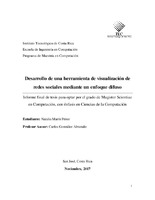Desarrollo de una herramienta de visualización de redes sociales mediante un enfoque difuso
Resumen
A social network is a concept based on graph theory, which allows to linking between different type of objects depending on the how it is applied. This type of link, usually is binary-like, so the objects may or may not be related to each other. On the other hand, there are multiple applications where this kind of analysis is insufficient, certain objects could belong to more than one group at the same time. For example, one person that resides in certain place may need to move because of studies for 5 days a week. So, they stay at home for two days and the rest is spent outside. How can we represent this situation? Using fuzzy logic, we can provide a greater weight to the individual spending time outside (5/7) and (2/7) in its home. To resolve this, a visualization model approach was developed that is based on social network graphs, it supports the investigation of fuzzy groups in weighted directed graphs and can be adjusted to provide different levels of detail by using spatial data and fuzzy clustering. This helps find new social behavior patterns according to the dataset and the type of application. The visualization was showcased using the Costa Rican migration dataset as well as a dataset generated through a temporary internal migration survey. The case studies showed that our visualization approach helps understand better the fuzzy relationship in a social network.
Descripción
Proyecto de Graduación (Maestría en Computación) Instituto Tecnológico de Costa Rica, Escuela de Ingeniería en Computación, 2017.
Compartir
Métricas
Colecciones
- Maestría en Computación [119]


